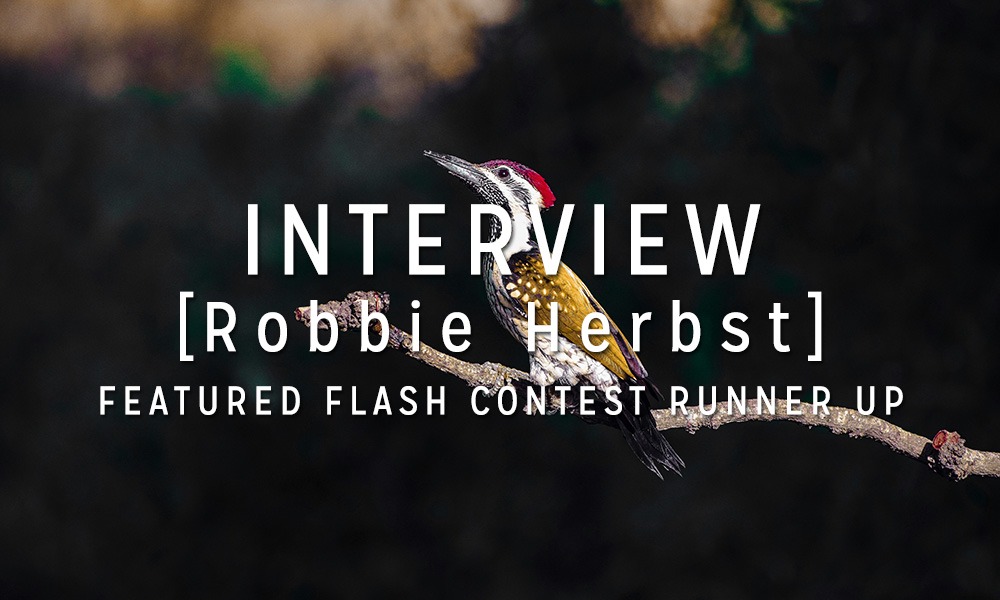On Monday, we published Robbie Herbst’s “The Beak,” one of our two runners-up in this year’s Featured Flash Contest. Make sure you read this weird flash of transformation, and then check out our interview with the winner below!

What sparked this story, or led you to write this piece?
I’ve always been drawn to transformations (especially transforming into animals) in fiction. This probably stems from my childhood love of the Animorphs series. Over time, this expanded into an interest in body horror, especially David Cronenberg movies. The Fly was definitely a point of reference for this story. Something important about that film is that Jeff Goldblum’s character doesn’t just turn into a fly; he likes (at least at first) turning into a fly. For me, that’s where the interest lies. It’s the same in my story—it’s not the beak itself, but the protagonist’s (and other people’s) reaction to it that’s interesting.
The first technical that jumps out in reading this piece is your section breaks, which are numbered rather than the more traditional blank space or dinkus (I mostly just wanted to say “dinkus” here. I do not get enough chances to use that word). Those numbered section breaks also serve as paragraph breaks for all but the final paragraph in the piece. How did you come to that strategy, and where in the writing process did it occur to you to break it that way?
I actually went back and forth on numbers vs. no numbers after the story was finished. Ultimately, I think they structure the reader’s experience and the tone in which the story is read. They imply a more rigorous order than paragraph breaks or dinkus (didn’t know that word) would, almost as if this process of transformation has been predetermined by someone or something.
This story is written in present tense. Maybe I’m way off-base here (and obviously there are tons of examples that are counter to my claim), but I feel like I see the immediacy of present tense used to powerful effect most often in flash pieces and other shorter fiction forms—is there something about the tense that lends itself to this particular space? And of course, what led you to that choice for this piece in particular?
Your question sent me through my other published flash fiction, and I can report that this is actually the only one that’s in present tense. As an experiment, I just tried putting this story in past tense to gauge the effect—I don’t think it works. There’s a haziness or even hallucinatory quality to the present tense, whereas the past tense can feel so strictly factual. Whatever the tense, in flash one of the crucial things is controlling the narrative time. This story segments time into paragraph chunks, which gave me some agility and freedom on the page. My favorite flashes exploit the form to move at nauseating speeds through life. Two classic stories that do this are George Saunders’s “Sticks” and Don Barthelme’s “The School.”
As a reader, flash fiction is so fascinating to me. The choices a writer makes have to be so carefully controlled; there simply isn’t room for all the machinations of character and plot and setting and exposition and narrative summary and whatnot that longer work often explores—hell, in this piece, the only other characters that even appear are the mother and the naturalists, both of which show up exactly once. I don’t have a tremendously focused question here; I’d just love if you could talk a bit about the unique challenges and opportunities that flash provides for a writer and a story.
Who needs all that stuff! Flash fiction takes you out of your habits as a writer and makes you decide what really matters. At the same time, I’ve read a lot of flash that doesn’t, well, spark. There has to be some escalation, some sense of surprise that makes the reader go back and read it again. I know I have an idea for a flash piece rather than a longer story when the concept lends itself to restraint and paring down. If the short space will choke a narrative, or if it’s just an excuse to stop writing at 1,000 words, it won’t work as flash.
I’m that annoying guy at the reading that always wants to ask the super-cliché questions, so apologies in advance. First, can you tell us a bit about your writing routine? (mornings with coffee pecking at the keys; ten hours in front of a keyboard every day; chunks when inspiration strikes, et cetera?) And the story process itself: are you a seventeen drafts before even your first reader sees it kind of writer, or does it all flow brilliantly to fountain pen on first thought without stopping (someone someday will reply yes to that, I’m sure), or do you write a single sentence a million times until it’s perfect, or…?
By nature, I’m not a person of routines. I prefer to write something in one burst, when the idea demands to get out. But I’ve also been working on a novel this last year, and the biggest lesson I’ve learned is that if you want to do a larger form, you have to make yourself sit down and write the words every day. Inspiration follows effort, in that case. But for this story, I had the idea and sat down and wrote it and did most of the edits in a very short window. I’m not a perfectionist. It’s my biggest flaw and also something I’m very grateful for.
Interviewed by Brandon Williams
